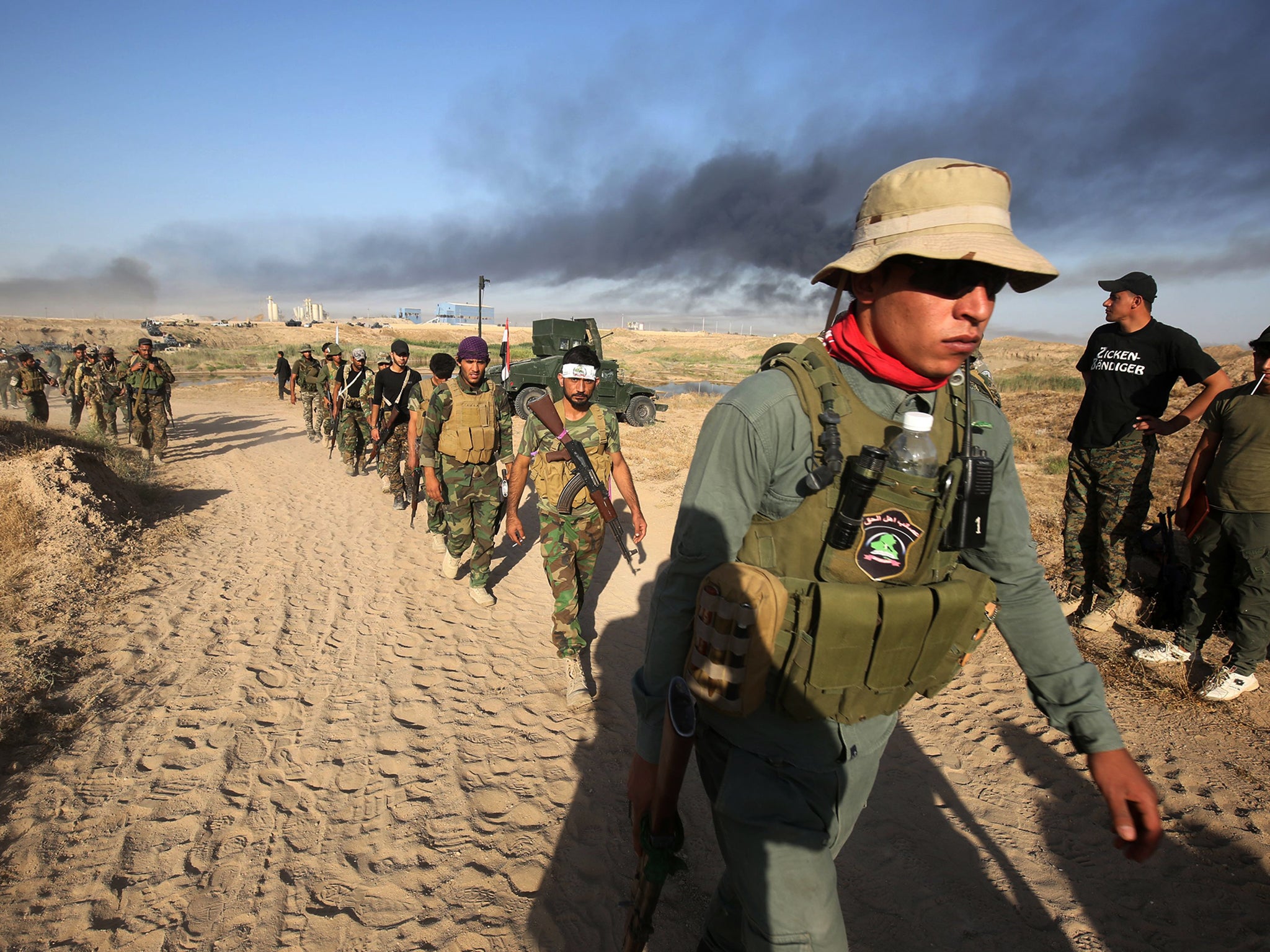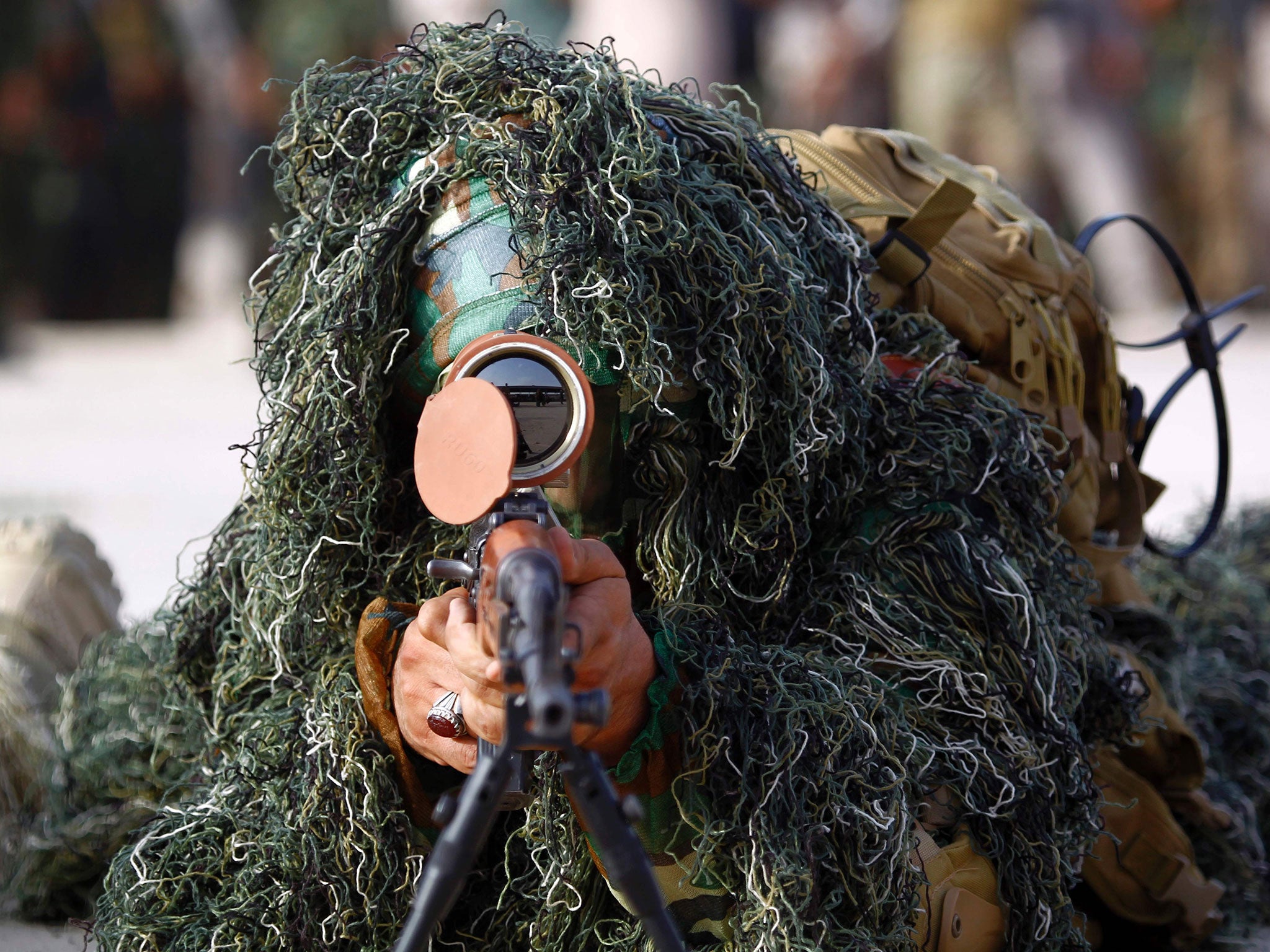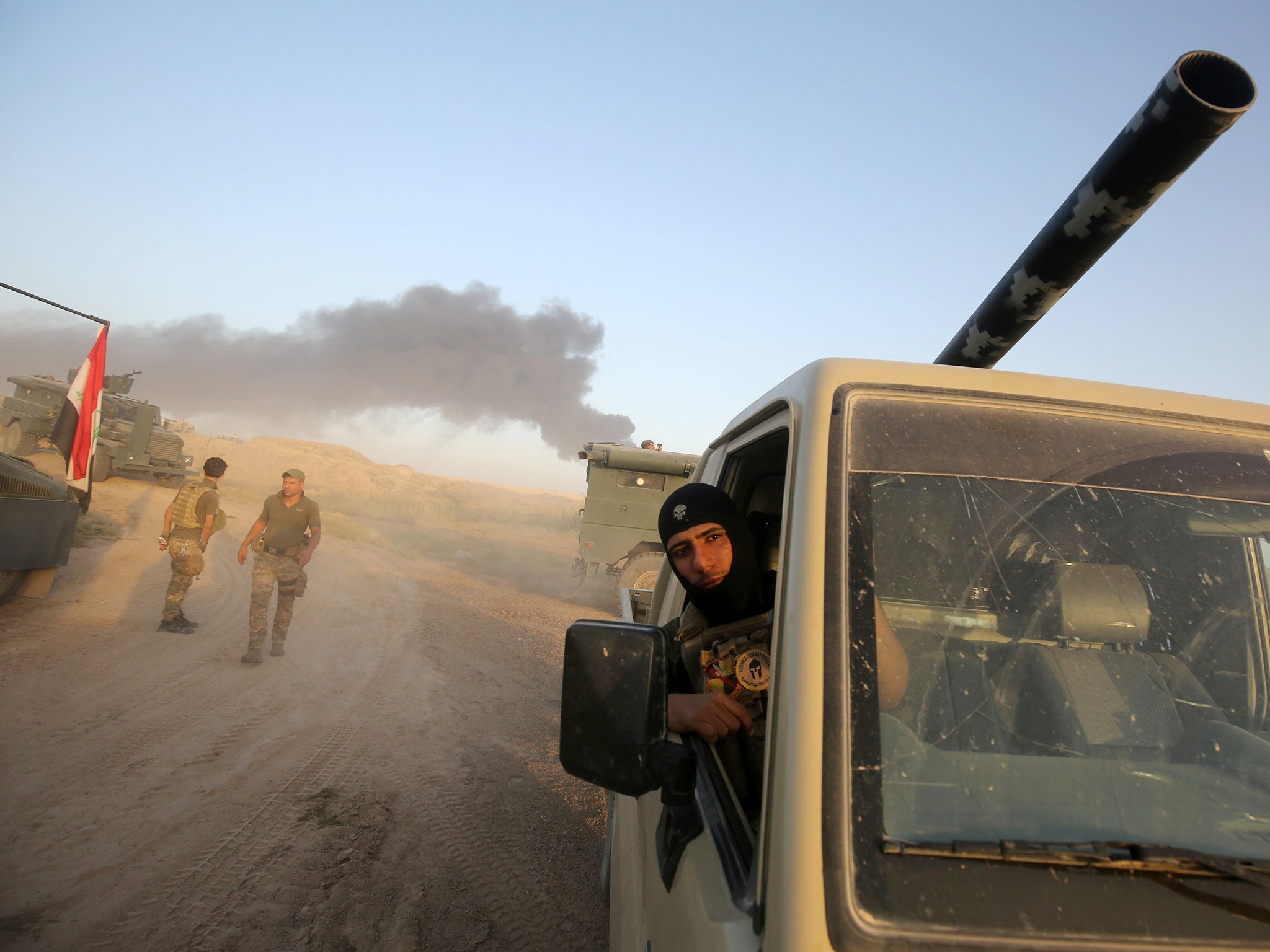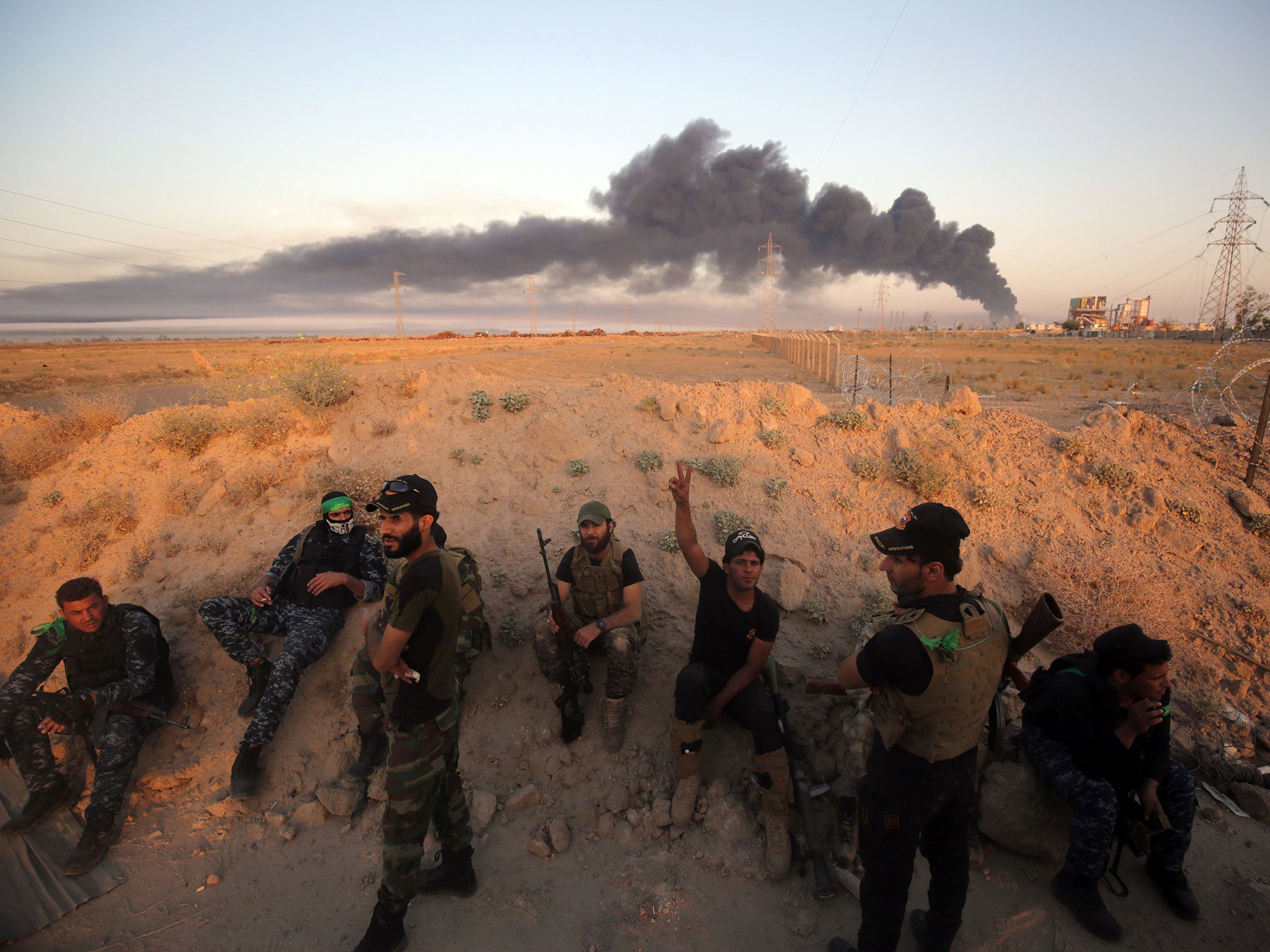Isis in Iraq: Jihadists unleash death squads as Iraqi forces advance on stronghold of Fallujah
The Iraqi government is desperate to retake the city, but Isis is giving orders to kill anyone who tries to flee or surrender

Your support helps us to tell the story
From reproductive rights to climate change to Big Tech, The Independent is on the ground when the story is developing. Whether it's investigating the financials of Elon Musk's pro-Trump PAC or producing our latest documentary, 'The A Word', which shines a light on the American women fighting for reproductive rights, we know how important it is to parse out the facts from the messaging.
At such a critical moment in US history, we need reporters on the ground. Your donation allows us to keep sending journalists to speak to both sides of the story.
The Independent is trusted by Americans across the entire political spectrum. And unlike many other quality news outlets, we choose not to lock Americans out of our reporting and analysis with paywalls. We believe quality journalism should be available to everyone, paid for by those who can afford it.
Your support makes all the difference.Isis execution squads have appeared in the streets of Fallujah, a city 40 miles west of Baghdad, with orders to kill anybody trying to flee or surrender as government forces advance towards this Isis stronghold. “Groups of Isis fighters are saying they will kill anybody in Fallujah who leaves their house or waves a white flag,” says Ahmed al-Dulaimi, a political activist who spoke by phone to relatives and friends in the city.
Iraqi army units started an offensive east of Fallujah on Monday morning after heavy shelling and airstrikes overnight. Mr Dulaimi said that Shia militias known as the Hashd al-Shaabi were joining in the bombardment with a home-made-rocket called “the Nimr”, named after the leader of the Saudi Shia minority, Sheikh Nimr al-Nimr, who was executed by the Saudi authorities in January this year.
The loss of Fallujah, a Sunni commercial hub on the main road to Jordan, would be a serious blow to Isis. Its capture of the city so close to Baghdad at the beginning of 2014 was the extremist Sunni movement’s first spectacular military victory. An interesting development on Monday was a report that three Isis gunmen were killed inside Fallujah which would be a first sign of armed resistance by local people to Isis.
The Iraqi Prime Minister Haidar al-Abadi claimed a “big success” by his troops within hours of the start of the operation. Wearing the black uniform of Iraq’s counter-terrorism forces he said that it had already achieved “more than was planned” as he met with commanders of the Fallujah Operational Command. Earlier in a television address on Sunday night, he pledged to “tear up the black banners of strangers who usurped the city.”
Mr Abadi is under intense popular pressure in Baghdad to drive Isis out of Fallujah after bomb attacks on civilian targets earlier in the month that killed at least 200 people. “Rightly or wrongly people in Baghdad believe these bombs are coming out of Fallujah and they want the city taken,” says a retired senior Iraqi official. The failure of government forces to expel Isis from a city so close to the capital for over two years has for long discredited its claims that it is defeating Isis.
The Iraqi armed forces are short of combat-ready soldiers and they are reliant on two brigades of well-trained and experienced counter-terrorist troops numbering about 5,000 men. In addition, there are two divisions of the regular army able to fight, but military success over the last year has been dependent on support from the US-led air coalition which destroys Isis positions while Iraqi troops act as a mopping up force.

Fallujah has already suffered badly from prolonged fighting and lack of food supplies. Local sources estimate that its population is down to between 50,000 and 60,000 people compared to 350,000 in 2011 before Iraq slid back into a full scale war. An Iraqi observer with contacts in the city said that “people have been starving there over the last six months because there is little food coming in. A 50 kilo bag of flour costs 800,000 Iraqi dinars (£470).” He added that many in Fallujah were trying to supplement their diet by fishing in the Euphrates River, but they “only catch a few small fish.”
Fallujah is not entirely surrounded on all sides and there is one desert road open to the north through which comes a trickle of food supplies, but these are monopolised by Isis fighters for their own use. Other sides of the city are besieged with the Iraqi army and Shia militia to the east, anti-Isis Sunni tribal militia to the south and more government forces, backed by US troops, around Habbaniyah to the west. The main attack on Monday was being directed towards the agricultural town of Garma where Isis has lost some ground in farming areas.

People in Fallujah are reported by refugees to be terrified of Isis, but equally so of the Shia militias whom they say refer on their social media to “Terrorist Fallujah”. Isis withdrew from other cities like Ramadi, Hit and Rutba without fighting to the last man, but their fighters might do so for Fallujah because of its military and political importance. In 2004 it was the target of two famous sieges by the US Marines that left much of it in ruins. Ramadi, the capital of Anbar province, once had a population of 400,000, but 70 per cent of it was destroyed by US airstrikes and only about 15 per cent of its people have been able to return. Fallujah may well suffer the same fate.
The Iraqi government will have to recapture Fallujah at some point because of the threat it poses to Baghdad and its importance as a sign that Isis is undefeated. But previous government offensives have been marked by stops and starts because of divisions between the US, the Iraqi government, Shia militias and Kurds. Mr Abadi may also want to assert his patriotic credentials after protesters demanding an end to corruption and appointment of a technocratic cabinet burst into the Green Zone two days ago. They were driven out by security forces firing live rounds as well as tear gas and two protesters were killed and 60 wounded. Mr Abadi claims that the counter-offensive against Fallujah has been delayed by political divisions in Baghdad.

The so-called Islamic State is showing signs of weakening but its many opponents also have their weaknesses. The US has been pushing for ground offensives against Mosul and Raqqa, but ground forces in Iraq and Syria may not be capable of taking them this year. “There is no real plan about what to do after they have fallen,” says Hiwa Osman, an independent political analyst based in Irbil. “Only the Sunni Arabs can really put an end to Isis and until they do so it will never be really finished.”
Patrick Cockburn is the author of ‘Chaos and Caliphate: Jihadis and the West in the Struggle for the Middle East’, published by OR Books, £18. Readers can obtain a 15 per cent discount by using the code: INDEPENDENT
Join our commenting forum
Join thought-provoking conversations, follow other Independent readers and see their replies
Comments